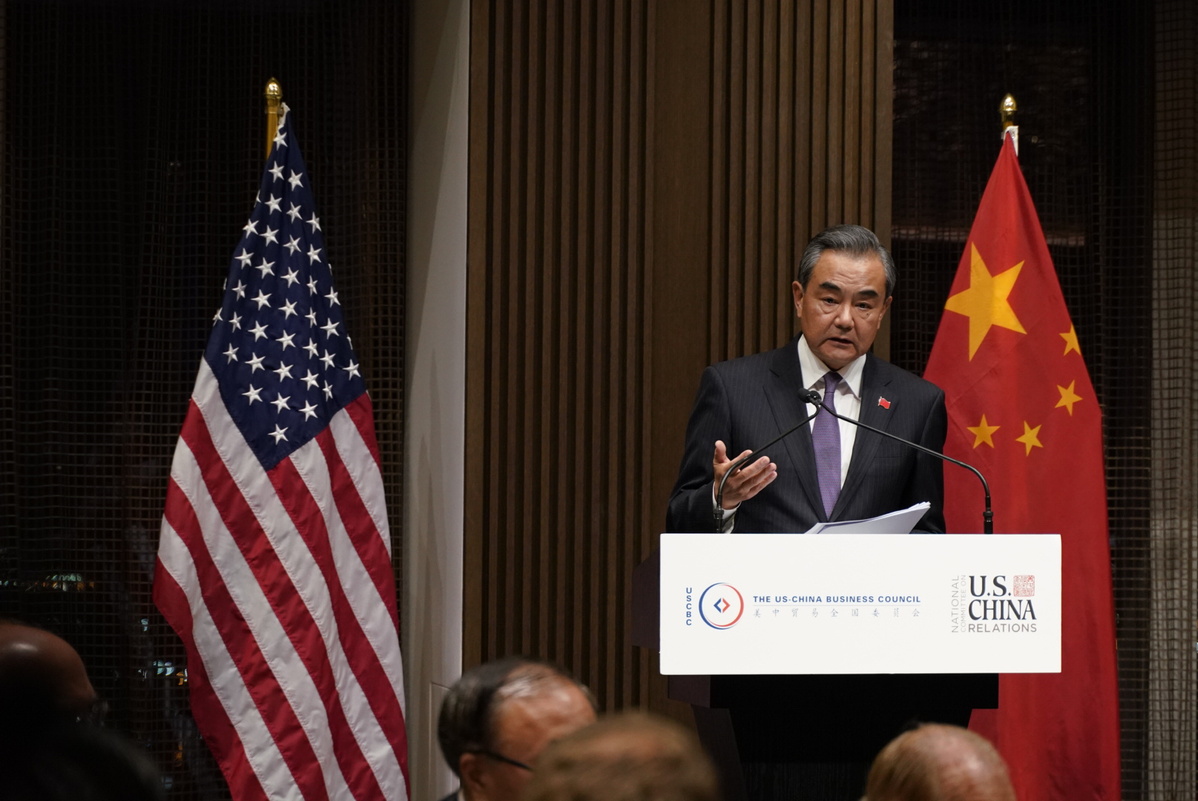Wang Yi: Two paths for 'giant ship' of relations
By HONG XIAO in New York | China Daily Global | Updated: 2019-09-25 09:32

Chinese State Councilor and Foreign Minister Wang Yi said the "giant ship" of China-US relations is faced with two very different routes.
"One features calm seas and broad prospects and the other is churning waters and raging waves," Wang said, suggesting turning to history and looking at the past four decades of China-US relations for inspiration and guidance.
Wang spoke at a reception co-hosted by the National Committee on US-China Relations and the US-China Business Council. He is in New York to attend the 74th session of the United Nations General Assembly.
Wang underlined that mutually beneficial cooperation is the only right option for China and the US, and neither country has taken advantage of the other.
"There is a claim in the United States that the country has been 'ripped off' in its cooperation with China, Is that really so? Of course not." Wang said.
This year marks the 70th anniversary of the founding of the People's Republic of China as well as the 40th anniversary of China-US diplomatic relations.
Wang said it is a historical moment that means a lot to both nations.
"We need to stand high, look far and take this bilateral relationship forward with vision and conviction," he said.
Wang said that over the past four decades, China-US relations have weathered many twists and turns but "steadily moved forward with progress beyond even the boldest imagination", he said.
"On the other hand, however, China-US relations today have once again come to a crossroads," he added, pointing out that "some people are using every means to depict China as a major adversary, marketing their prophecy that the relationship is doomed to fall into the Thucydides Trap, the Clash of Civilizations Trap, and even clamor for a full 'decoupling' with China."
Wang said that over four decades, the China-US trade in goods surged by 252 times. A USCBC report found that between 2009 and 2018, US exports to China alone have supported more than 1.1 million jobs in the US.
Ninety-seven percent of the US companies surveyed reported profits from doing business with China. And trade with China has saved $850 a year for every US family on average.
Wang believes that economic globalization, as the trend of the times, should not and cannot be held back. And issues between nations should be addressed by enhancing global governance through equal dialogue and consultation.
"Neither scapegoating nor unilaterally initiating a trade war is the right prescription," he said.
He said the trade frictions between China and the US in the past year and more have inflicted losses on both countries. He cited data from the Federal Reserve Bank of New York that estimated that due to additional tariffs imposed on the $250 billion of Chinese exports in 2018, American consumers would have to spend an extra $52.8 billion every year. That equates to $ 414 more in expenditures for every US family.
Wang emphasized that opening-up and integration represents the right direction, and neither China nor the US can move ahead without the other.
"Given the size of our economies and the level of interdependence, the so-called decoupling or shutting the door to each other is just like an attempt to build castles in the air. It is neither sensible nor realistic," he said.
As the world's second-largest importer of goods and services, China has the world's biggest and most promising market, with the largest and fastest-growing middle-income population.
"Decoupling from the Chinese economy would be decoupling from the opportunities, and from the future," said Wang.
Wang said conflict and confrontation will lead nowhere, and neither country can mold the other in its own image.
"Differences and disparities should not be a chasm that prevents people from engaging each other, but impetus to mutual learning and shared progress," he said.
Wang called on the two countries to shoulder responsibilities together in accord with the trend of history.
Wang also responded to accusations the US has made over China's Belt and Road Initiative, Taiwan, the Hong Kong Special Administrative Region and the Xinjiang Uygur autonomous region.
He said that measures taken in Xinjiang in recent years have a clear-cut purpose: to prevent extremism and terrorism at their roots.
"These measures are consistent with Chinese law and common approaches advocated in the global community," he said. "We are fully open and aboveboard, and we are confident that no vile smears will work."
Henry Kissinger, chairman of Kissinger Associates and former US secretary of state, said via video that at this moment, it is more important than ever to have a constructive dialogue between the two sides.
"A constructive dialogue must respect the core interests of both countries," Kissinger said.
He said the two countries have different social systems, "but the two countries must also understand that conflict is not an option".
"Each of the sides will believe in the validity of their points of view, but the peace of the world cannot be achieved without a willingness to consider the point of view of other parties. We started this relationship. And history imposes on us the need to deepen it and to apply it to situations on which the peace of the world and the progress of the world depends," Kissinger said.
























